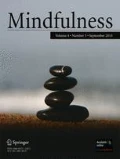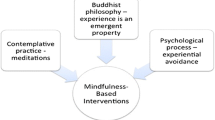Abstract
The research literature on mindfulness and meditation (MM) practices in psychology is replete with descriptions of the meditative process and its possible mechanisms of action. The mainstreaming of MM has endeavored to shed its practices of Buddhist truth claims, appealing to the universality of introspection and attentional control. However, ostensibly secularized studies and practices on MM may be committing to unsupported epistemic and metaphysical arguments through their use of language. This critique broadly addresses language used in the field of research psychology and clinical practice that suggests a level of epistemic accuracy of descriptions of MM practices—or the level to which a person is able to perceive truth in the world, as well as metaphysical claims about personal identity and the universe. The epistemic accuracy and metaphysical aspects of MM practices are not supported in secular research studies. Examples of these possible claims in secular research are presented and critiqued. Ethical considerations of language use in MM studies and instructions are also discussed. This commentary cautions against the use of poorly defined terms and calls for a broader philosophical review of epistemic and metaphysical claims in secular literature.
Similar content being viewed by others
References
Baer, R. A. (2003). Mindfulness training as a clinical intervention: A conceptual and empirical review. Clinical Psychology: Science and Practice, 10, 125–143. https://doi.org/10.1093/clipsy.bpg015
Baer, R. A. (2011). Measuring mindfulness. Contemporary Buddhism, 12(1), 241–261. https://doi.org/10.1080/14639947.2011.564842
Baer, R. A., Smith, G. T., Hopkins, J., Krietemeyer, J., & Toney, L. (2006). Using self-report assessment methods to explore facets of mindfulness. Assessment, 13, 27–45. https://doi.org/10.1177/1073191105283504
Bodhi, B. (2011). What does mindfulness really mean? A Canonical Perspective. Contemporary Buddhism, 12(1), 19–39. https://doi.org/10.1080/14639947.2011.564813
Brown, K. W., Ryan, R. M., & Creswell, J. D. (2007). Mindfulness: Theoretical foundations and evidence for its salutary effects. Psychological Inquiry, 18, 211–237. https://doi.org/10.1080/10478400701598298
Coffey, K. A., Hartman, M., & Fredrickson, B. L. (2010). Deconstructing mindfulness and constructing mental health: Understanding mindfulness and its mechanisms of action. Mindfulness, 1(4), 235–253. https://doi.org/10.1007/s12671-010-0033-2
Gratz, K. L., & Roemer, L. (2004). Multidimensional assessment of emotion regulation and dysregulation: Development, factor structure, and initial validation of the difficulties in emotion regulation scale. Journal of Psychopathology and Behavioral Assessment, 26(1), 41–54. https://doi.org/10.1023/B:JOBA.0000007455.08539.94
Grossman, P., Niemann, L., Schmidt, S., & Walach, H. (2004). Mindfulness-based stress reduction and health benefits: A meta-analysis. Journal of Psychosomatic Research, 57, 35–43. https://doi.org/10.1016/s0022-3999(03)00573-7
Hanley, A. W., & Garland, E. L. (2017). Clarity of mind: Structural equation modeling of associations between dispositional mindfulness, self-concept clarity and psychological well-being. Personality and Individual Differences, 106, 334–339. https://doi.org/10.1016/j.paid.2016.10.028
Hölzel, B. K., Lazar, S. W., Gard, T., Schuman-Olivier, Z., Vago, D. R., & Ott, U. (2011). How does mindfulness meditation work? Proposing mechanisms of action from a conceptual and neural perspective. Perspectives on Psychological Science, 6(6), 537–559. https://doi.org/10.1177/1745691611419671
Kabat-Zinn, J. (1990). Full catastrophe living: Using the wisdom of your body and mind to face stress, pain, and illness. Delacorte.
Kabat-Zinn, J. (2003). Mindfulness-based interventions in context: Past, present, and future. Clinical Psychology: Science and Practice, 10(2), 144–156. https://doi.org/10.1093/clipsy.bpg016
Kabat-Zinn, J. (2011). Some reflections on the origins of MBSR, skillful means, and the trouble with maps. Contemporary Buddhism, 12(1), 281–306. https://doi.org/10.1080/14639947.2011.564844
Kabat-Zinn, J. (2017). Too early to tell: The potential impact and challenges—Ethical and otherwise—Inherent in the mainstreaming of dharma in an increasingly dystopian world. Mindfulness, 8(5), 1125–1135. https://doi.org/10.1007/s12671-017-0758-2
Kang, C., & Whittingham, K. (2010). Mindfulness: A dialogue between Buddhism and clinical psychology. Mindfulness, 1(3), 161–173. https://doi.org/10.1007/s12671-010-0018-1
Kornfield, J. (2008). The wise heart: A guide to the universal teachings of Buddhist psychology. Bantam.
Langer, E. J. (1989). Mindfulness. Addison-Wesley.
Langer, E. J., Chanowitz, B., & Blank, A. (1985). Mindlessness–mindfulness in perspective: A reply to Valerie Folkes. Journal of Personality and Social Psychology, 48(3), 605–607. https://doi.org/10.1037/0022-3514.48.3.605
Lutz, A., & Dunne, J. D. (2007). Meditation and the neuroscience of consciousness: An introduction. Cambridge Handbook of Consciousness, 11, 499–551. https://doi.org/10.1017/CBO9780511816789.020
Lutz, A., Slagter, H. A., Dunne, J. D., & Davidson, R. J. (2008). Attention regulation and monitoring in meditation. Trends in Cognitive Sciences, 12, 163–169. https://doi.org/10.1016/j.tics.2008.01.005
Nash, J., & Newberg, A. (2013). Toward a unifying taxonomy and definition for meditation. Frontiers in Psychology, 4(806). https://doi.org/10.3389/fpsyg.2013.00806.
Rahula, W. (1967). What the Buddha taught. Gordon Fraser.
Sedlmeier, P., Eberth, J., Schwarz, M., Zimmermann, D., Haarig, F., Jaeger, S., & Kunze, S. (2012). The psychological effects of meditation: A meta-analysis. Psychological Bulletin, 138(6), 1139–1171. https://doi.org/10.1037/a0028168
Shapiro, S. L., & Carlson, L. E. (2017). The art and science of mindfulness: Integrating mindfulness into psychology and the helping professions (2nd ed.). American Psychological Association.
Shapiro, S. L., Carlson, L. E., Astin, J. A., & Freedman, B. (2006). Mechanisms of mindfulness. Journal of Clinical Psychology, 3(62), 373–386. https://doi.org/10.1002/jclp.20237
Sharf, R. H. (2015). Is mindfulness Buddhist? (And why it matters). Transcultural Psychiatry, 52(4), 470–484. https://doi.org/10.1177/2F1363461514557561
Sinha, J. (1958). Indian psychology. Sinha Publishing House.
Thera, N. (2014). The heart of Buddhist meditation: The Buddha's way of mindfulness. Weiser Books.
Thompson, E. (2020). Why I am not a Buddhist. Yale University Press.
Vago, D. R., & Silbersweig, D. A. (2012). Self-awareness, self-regulation, and self-transcendence (S-ART): A framework for understanding the neurobiological mechanisms of mindfulness. Frontiers in Human Neuroscience, 6, 296. https://doi.org/10.3389/fnhum.2012.00296
Van Gordon, W., Shonin, E., Griffiths, M. D., & Singh, N. N. (2015). There is only one mindfulness: Why science and Buddhism need to work together. Mindfulness, 6(1), 49–56. https://doi.org/10.1007/s12671-014-0379-y
Vohs, K.D., & Baumeister, R.F. (2004). Understanding self-regulation. In R.F. Baumeister & K.D. Vohs (Eds.), Handbook of self-regulation (pp. 1–12). Guilford.
Waelde, L. C., & Thompson, J. M. (2016). Traditional and secular views of psychotherapeutic applications of mindfulness and meditation. In M. West (Ed.), The psychology of meditation (pp. 119–152). Oxford University Press.
Acknowledgements
My thanks to this journal’s editor and reviewers for their comments that improved the strength of this paper. Additionally, and most personally, I would like to thank Prof. Wendy Packman, Scott Hines, Joshua Marshall, Prof. Lynn Waelde, and Prof. Jonathan Schooler for their feedback, patience, and encouragement.
Author information
Authors and Affiliations
Corresponding author
Ethics declarations
Ethical Approval
The critique does not involve human or animal participants.
Conflict of Interest
The author declares no competing interests.
Additional information
Publisher's Note
Springer Nature remains neutral with regard to jurisdictional claims in published maps and institutional affiliations.
Rights and permissions
About this article
Cite this article
Brumett, A. The Vagueness of Clarity: Metaphysical and Epistemic Truth Claims in the Empirical Study of Mindfulness Practices. Mindfulness 12, 2132–2140 (2021). https://doi.org/10.1007/s12671-021-01683-9
Accepted:
Published:
Issue Date:
DOI: https://doi.org/10.1007/s12671-021-01683-9




